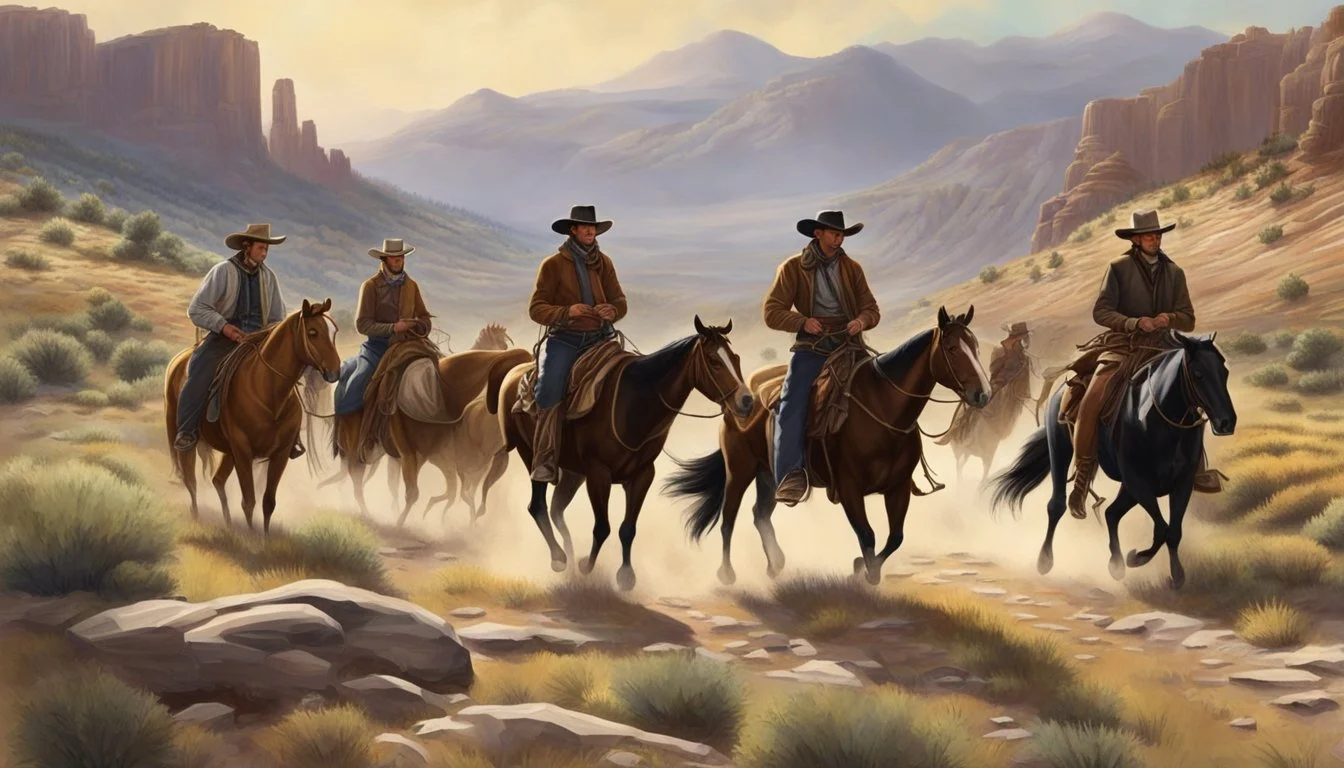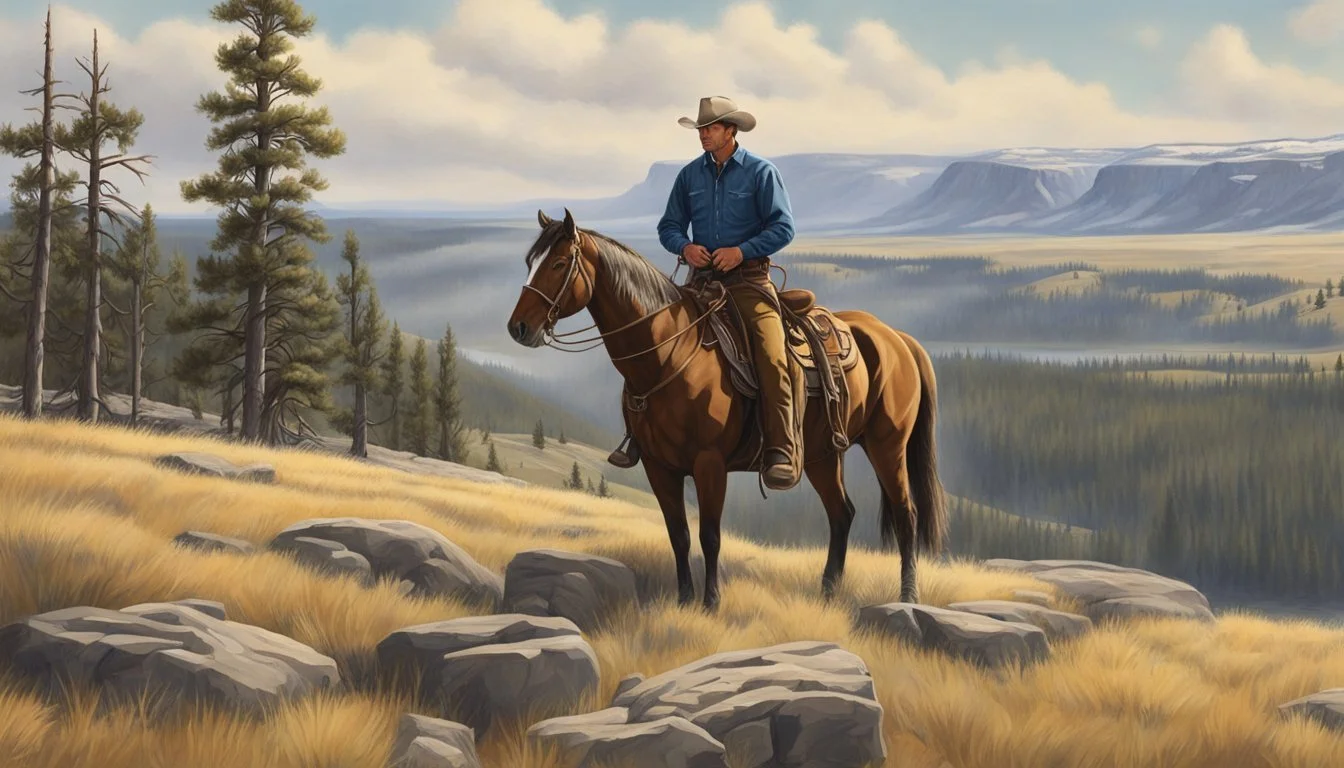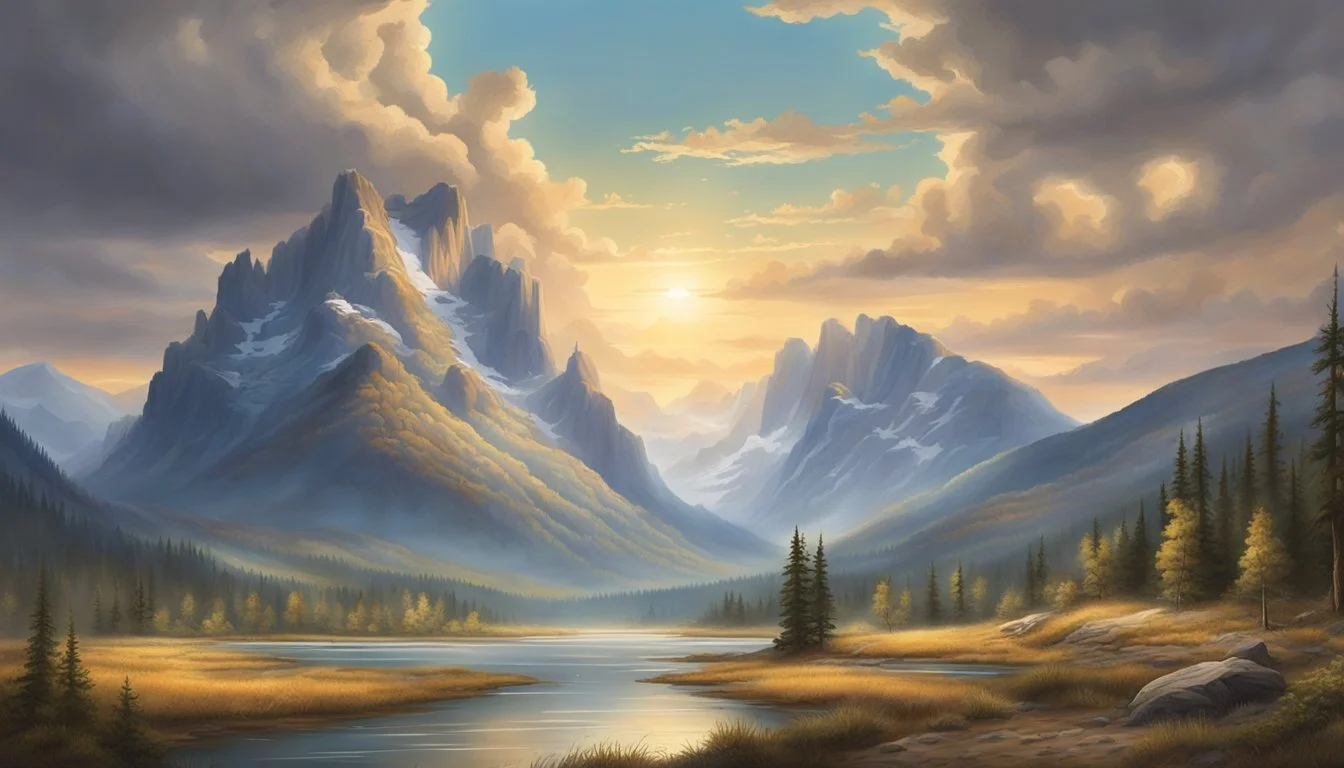Yellowstone Unleashes the Untamed Spirit of the American Frontier Like Never Before
Yellowstone, the hit television series starring Kevin Costner, has struck a deep chord with American audiences. Set against the backdrop of Montana's rugged landscapes, the show taps into the enduring allure of frontier mythology and cowboy culture. Its popularity stems from more than just entertainment value - it resonates with viewers by capturing something essential about the American spirit.
Through its characters, storylines, and cinematography, Yellowstone brings to life the ethos of the American frontier in ways both familiar and fresh. The show tackles complex issues surrounding land ownership, family legacy, and the clash between tradition and progress. These themes reflect ongoing tensions in American society, particularly in rural and Western regions.
Beyond its dramatic elements, Yellowstone incorporates authentic perspectives on ranching heritage and Native American history. This attention to cultural and historical accuracy lends depth to the series, allowing it to serve as a mirror for contemporary American values and conflicts. As viewers tune in week after week, they see reflections of their own experiences, aspirations, and anxieties played out on screen.
Origins of Yellowstone
Yellowstone emerged as a groundbreaking television series that captured the essence of the American frontier. Its creation and development into a cultural phenomenon stem from a unique vision and storytelling approach.
From Concept to Cultural Phenomenon
Yellowstone debuted on the Paramount Network in 2018. The show quickly gained a massive following, becoming one of cable television's most-watched series. Its popularity led to the expansion of the Yellowstone universe with prequels like 1883 and 1923.
Yellowstone's success lies in its portrayal of modern-day cowboys and the struggles of maintaining a family ranch. The series taps into themes of land ownership, family legacy, and the changing face of the American West.
Kevin Costner's star power as John Dutton helped draw initial audience interest. The show's stunning visuals of Montana landscapes and complex character dynamics kept viewers coming back for more.
Taylor Sheridan's Vision
Creator Taylor Sheridan brought a unique perspective to Yellowstone. His background in acting and screenwriting informed the show's authentic dialogue and character development.
Sheridan aimed to tell stories about the American West that hadn't been seen on television before. He focused on exploring the conflicts between ranchers, land developers, and Native American tribes.
The writer-director's commitment to realism extended to the show's production. Many scenes were filmed on location in Montana, adding to the series' visual authenticity.
Sheridan's vision for Yellowstone expanded beyond a single show. He created a broader universe that explores different eras of American frontier history through various spinoff series.
Setting the Scene
Yellowstone's vivid portrayal of Montana's rugged landscapes and ranch life provides a stunning backdrop for the series' drama. The show immerses viewers in the breathtaking natural beauty and harsh realities of the American West.
Montana's Majestic Backdrop
Montana's vast, untamed wilderness serves as a character in its own right. Sweeping vistas of snow-capped mountains, rolling prairies, and pristine forests create a sense of awe and isolation. The show's cinematography captures the changing seasons, from golden summer fields to stark winter landscapes.
Wildlife plays a prominent role, with scenes of grazing bison, prowling wolves, and soaring eagles. These elements reinforce the wildness of the setting and the challenges faced by those who call it home.
Ranch Life and the Dutton Family
The Dutton Ranch stands as the centerpiece of Yellowstone's world. This sprawling cattle operation embodies the traditional Western lifestyle, complete with:
Rustic log buildings
Corrals and barns
Working cowboys on horseback
The Duttons' daily routines showcase the grit required to maintain a modern ranch. Scenes of cattle drives, fence mending, and predator management highlight the family's deep connection to the land.
Inside the ranch house, family dynamics unfold against a backdrop of Western decor and family heirlooms. This setting emphasizes the Duttons' long history in Montana and their determination to preserve their way of life.
Historical Context
Yellowstone draws deeply from America's frontier heritage and complex relationships with indigenous peoples. The show's portrayal reflects enduring tensions and cultural influences that shaped the American West.
Echoes of the American West
The American West looms large in Yellowstone's narrative. The show captures the rugged individualism and self-reliance emblematic of cowboy culture. Characters like John Dutton embody the frontier spirit that drove westward expansion.
Yellowstone depicts ranching traditions passed down for generations. This reflects the real history of cattle barons who built empires on vast tracts of land. The show's conflicts over property rights echo actual range wars of the late 19th century.
The Civil War's aftermath reverberates through Yellowstone's Montana setting. Many settlers moved west seeking new opportunities after the war. This migration reshaped the region's demographics and power dynamics.
Influence of Indigenous Cultures
Yellowstone acknowledges the complex history between settlers and Native Americans. The show features Broken Rock Reservation and explores land disputes reminiscent of actual treaty conflicts.
Indigenous characters like Thomas Rainwater provide perspectives often overlooked in Western narratives. Their storylines highlight ongoing struggles for sovereignty and cultural preservation.
The series touches on the painful legacy of forced relocation and assimilation policies. It shows how these historical injustices continue to impact tribal communities today.
Yellowstone incorporates elements of Native American spirituality and connection to the land. This reflects the enduring influence of indigenous cultures on the American West's identity.
Themes and Ideologies
Yellowstone explores core American ideals through its portrayal of frontier life. The show delves into complex political dynamics and land disputes while highlighting the resilience of its characters.
Struggle and Resilience
The Dutton family embodies the unyielding spirit of the American frontier. They face constant threats to their way of life, from corporate interests to rival ranchers. John Dutton's determination to protect his legacy reflects the rugged individualism often associated with the West.
Characters frequently confront harsh realities, showcasing their grit and adaptability. Beth Dutton's fierce business acumen and Rip Wheeler's unwavering loyalty demonstrate different facets of frontier resilience.
The ranch itself becomes a symbol of perseverance against modernization and changing times. Through various challenges, the Duttons cling to their land and traditions, mirroring the broader struggle to preserve a vanishing way of life.
Politics and Land Ownership
Land disputes form a central conflict in Yellowstone, highlighting the complex relationship between politics and property rights. The show explores tensions between private landowners, Native American tribes, and government entities.
John Dutton's political maneuvering reveals the intertwining of power and land ownership in Montana. His efforts to maintain control over the ranch often involve legal battles and strategic alliances.
The series also touches on environmental concerns and resource management. Conflicts arise over water rights, development projects, and conservation efforts, reflecting real-world debates in the American West.
Yellowstone portrays the lasting impact of historical land policies on contemporary issues. The show doesn't shy away from addressing the complexities of tribal sovereignty and the ongoing effects of past injustices.
Character Studies
Yellowstone's compelling characters embody different aspects of the American frontier spirit. Their complex personalities and motivations drive the show's narrative and provide insight into the mindset of the modern West.
John Dutton: A Man of the Land
John Dutton, portrayed by Kevin Costner, represents the archetypal rancher fighting to preserve his way of life. As the patriarch of the Dutton family, he embodies the rugged individualism and deep connection to the land that defines the frontier ethos.
John's unwavering commitment to protecting his ranch at all costs reflects the fierce independence associated with the American West. His character grapples with changing times, balancing tradition against progress.
Costner's nuanced performance brings depth to John's internal struggles. He portrays a man torn between family loyalty and personal ambition, often resorting to morally ambiguous methods to achieve his goals.
Beth Dutton: The Fierce Protector
Kelly Reilly's Beth Dutton is a force of nature, embodying the resilience and adaptability required to survive in harsh frontier environments. As the family's shrewd businesswoman, she combines ruthless tactics with unwavering devotion to her father's legacy.
Beth's complex character subverts traditional gender roles in Western narratives. Her sharp intellect and fierce determination make her a formidable opponent in both boardrooms and barrooms.
Reilly's powerful portrayal highlights Beth's vulnerabilities beneath her tough exterior. Her character's traumatic past and fiercely protective nature add emotional depth to the show's exploration of family dynamics.
Rip Wheeler: The Loyal Enforcer
Cole Hauser brings Rip Wheeler to life as the embodiment of frontier justice and unwavering loyalty. As the Dutton ranch's foreman and John's right-hand man, Rip represents the cowboy code of honor in its most extreme form.
Rip's character explores themes of found family and redemption. His devotion to the Duttons stems from a troubled past, showcasing how the frontier ethos can offer second chances to those willing to prove their worth.
Hauser's portrayal balances Rip's capacity for violence with moments of tenderness, particularly in his relationship with Beth. This complexity adds depth to the show's examination of morality in a world where traditional laws often fall short.
Cinematic Excellence
Yellowstone's visual and auditory elements elevate it beyond a typical Western drama. The show's technical mastery creates an immersive frontier experience for viewers.
Direction and Cinematography
Taylor Sheridan's vision shines through Yellowstone's striking visuals. The series showcases Montana's rugged landscapes with sweeping aerial shots and intimate close-ups of ranch life. Sheridan, known for films like Sicario and Wind River, brings his cinematic eye to television.
The camera work captures both the vastness of the West and the nuanced emotions of characters. Scenes often linger on weathered faces and sun-drenched vistas. This attention to visual detail grounds the show in a sense of place and authenticity.
Sheridan's direction emphasizes the harsh realities of frontier life. Action sequences are filmed with gritty realism, while quieter moments highlight the land's beauty and dangers.
Music and Atmosphere
Yellowstone's soundtrack amplifies its frontier atmosphere. The show features a blend of country music and original compositions that echo the spirit of the West. Artists like Whiskey Myers and Ryan Bingham contribute songs that feel organic to the ranch setting.
The score, composed by Brian Tyler, underscores key moments with stirring orchestral pieces. It evokes the grandeur of classic Westerns while maintaining a modern edge. Ambient sounds of nature - wind, horses, cattle - create a rich soundscape that immerses viewers in the ranch environment.
Music choices often reflect character emotions and plot developments. From rollicking bar tunes to mournful ballads, the soundtrack enhances the storytelling without overpowering it.
Cultural and Social Impact
Yellowstone has profoundly shaped American culture, influencing television, music, fashion, and tourism. The show's portrayal of rural life and traditional values has resonated deeply with audiences across the country.
Television as a Reflection of American Life
Yellowstone captures the essence of the American frontier spirit, depicting a world where family, land, and tradition reign supreme. The Dutton family's struggles mirror real-world conflicts over property rights and cultural preservation. The show's popularity has sparked renewed interest in Western-themed entertainment and country music.
Rural America finds representation in Yellowstone's portrayal of ranching life and small-town dynamics. This authenticity has struck a chord with viewers who feel their experiences are often overlooked in mainstream media.
The series also explores complex themes like Native American rights and environmental conservation, reflecting ongoing debates in American society.
Tourism and Public Engagement
Yellowstone's success has significantly boosted tourism in Montana and surrounding areas. Fans flock to filming locations, eager to experience the breathtaking landscapes showcased in the series.
Yellowstone National Park, already a popular destination, has seen increased visitor numbers. The show's depiction of the park's natural beauty has inspired many to explore America's first national park firsthand.
Local businesses have capitalized on the show's popularity, offering Yellowstone-themed tours, merchandise, and experiences. This influx of tourism has provided economic benefits to rural communities featured in the series.
The show has also raised awareness about conservation efforts in the region, particularly in areas like Hayden Valley, known for its wildlife and geothermal features.
Evaluation of Success
Yellowstone's triumph as a cultural phenomenon is evident in its impressive viewership and critical reception. The show's ability to capture the American frontier spirit has resonated strongly with audiences across the country.
Critical Acclaim and Audience Ratings
Yellowstone has garnered significant praise from both critics and viewers. Its authentic portrayal of modern Western life and complex character dynamics has earned it high ratings on various platforms. The show's nuanced exploration of land conflicts, family loyalties, and cultural tensions has struck a chord with audiences seeking genuine representations of rural America.
Critics have lauded the series for its stunning cinematography, capturing Montana's breathtaking landscapes. The performances, particularly Kevin Costner's portrayal of John Dutton, have received widespread acclaim. This positive reception has contributed to the show's growing popularity and cultural impact.
Live Viewers and the Penultimate Season
Yellowstone's penultimate season premiere drew an astounding 12 million live viewers. This figure dwarfs the viewership of other popular series, highlighting its exceptional appeal. For comparison, the penultimate season premiere of Succession attracted 1.4 million live viewers.
The show's ability to consistently draw large live audiences is particularly noteworthy in an era of streaming and on-demand viewing. This success indicates Yellowstone's status as appointment television, a rare feat in today's fragmented media landscape.
Yellowstone's massive viewership has solidified its position as a dominant force in American television. Its popularity extends beyond traditional demographics, attracting diverse audiences across age groups and regions.
Complexities and Relationships
Yellowstone portrays a web of intricate connections that drive the show's narrative. Characters navigate treacherous alliances and fierce rivalries in their quest for power and survival.
The Dutton Family Dynamics
At the heart of Yellowstone lies the Dutton family, led by patriarch John Dutton. Their relationships are marked by loyalty, conflict, and the weight of legacy. John's children - Beth, Jamie, and Kayce - grapple with their roles in the family business and their personal aspirations.
Beth's sharp wit and ruthless tactics contrast with Jamie's political ambitions and inner turmoil. Kayce balances his responsibilities to the ranch with his commitment to his Native American wife and son.
The Duttons face internal power struggles and differing views on preserving their land empire. These tensions create a compelling family drama that resonates with viewers.
Adversaries and Allies
Yellowstone's Montana setting is a battleground of competing interests. The Duttons contend with land developers, rival ranchers, and government officials seeking to chip away at their domain.
Native American tribes, led by characters like Thomas Rainwater, assert their rights and challenge the Duttons' claim to the land. This conflict adds depth to the show's exploration of historical injustices and modern power dynamics.
Shifting alliances and betrayals keep characters and viewers on edge. The line between friend and foe blurs as deals are made and broken in the struggle for control over the valuable Yellowstone ranch.
Looking to the Future
Yellowstone's portrayal of the American frontier spirit continues to evolve, shaping both its narrative and the wider Western genre. The show's future trajectory promises to explore new dimensions of ranch life and frontier culture.
Predictions for the Dutton Legacy
The Dutton family's struggle to maintain their ranch will likely face new challenges. Land developers and corporate interests may intensify their efforts to acquire Yellowstone Ranch. John Dutton's children could find themselves at odds over the property's future.
Beth Dutton might leverage her business acumen to modernize ranch operations. Kayce Dutton could emerge as a bridge between traditional ranching and Native American interests. Jamie Dutton's political career may intersect with the ranch's fate in unexpected ways.
The bunkhouse crew's loyalty will be tested as economic pressures mount. New alliances and rivalries may form, reflecting the changing dynamics of modern ranch life.
Evolution of the Western Genre
Yellowstone's success is inspiring a resurgence in Western-themed entertainment. Future productions may explore diverse perspectives within frontier narratives, including those of women, minorities, and indigenous peoples.
The genre could incorporate more contemporary issues like climate change and technological advancements in agriculture. This blend of traditional Western elements with modern themes may attract younger audiences.
Pop culture's fascination with the American West is likely to spark interest in authentic ranch experiences. This could lead to increased tourism in areas like Montana, where the show is set.
Television and streaming platforms may invest in more Western-inspired content, ranging from historical dramas to modern interpretations of frontier life.





